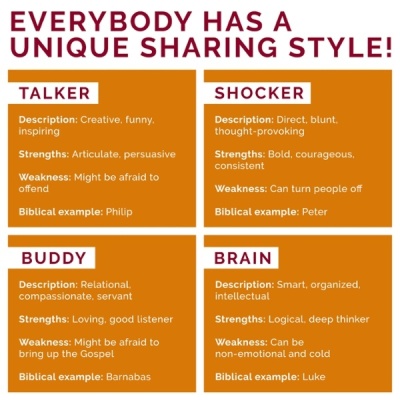What’s your faith-sharing style?

I used to think there was one “right” approach to evangelism.
But my wife, as so often happens in marriage, changed my way of thinking. About 25 years ago, I started noticing that she shared the Gospel very differently than I did.
My style was direct. I used humor and bold questions to get conversations started quickly. When I went to the shopping mall, for example, I looked for people to engage in Gospel conversations with.
It worked for me.
My wife’s style was more relational. She built relationships over time and introduced Jesus to people more slowly. When she went to the shopping mall, she didn’t evangelize. She shopped. But I also noticed that she had engaged many of her co-workers in Gospel conversations over time.
It worked for her.
So, with my wife in the back of my mind, I decided to search the New Testament to see if it depicted various styles of evangelism.
I discovered four: The Talker, The Shocker, The Buddy, and The Brain.
Talkers are able to winsomely bring up Gospel conversations in almost any situation. They are masters of what I call “the salvation segue.” They can turn random conversations into Gospel conversations almost effortlessly. Like the apostle Paul and Philip, talkers can masterfully turn almost any conversation toward Christ (Acts 8:26-40 and Acts 17:16-34).
Shockers are bold and direct. They can sometimes jar people with their boldness and pointed questions about spiritual subjects. Shockers, like the apostle Peter, may witness radical conversions take place as a result of their confident declarations about the good news of the Gospel (Acts 2:14-41).
Buddies are relational and kind. They build strong relationships over time and really help people fill in the gaps of the Gospel message, both with their lives and their lips. Buddies are often excellent disciple-makers. They don’t just make converts. Because of their life-on-life investment in others, they make disciples who make disciples. Like Aquila and Priscilla, they gently take others aside and explain to them the way of God more adequately (Acts 18:24-26).
Brains are logical and relentless. They “make a case for Christ” through well-researched arguments and apologetics. Like the good Dr. Luke who wrote Luke and Acts to one disciple, Theophilus. They know what they believe about the Gospel and why they believe it, and they’re committed to helping unbelievers embrace the same conclusions (Luke 1:1-4).
Every style has both strengths and weaknesses, as the graph above demonstrates.
Identify your style. Maximize your strengths. Minimize your weaknesses. And keep your eyes on Jesus, the ultimate blend of all of these styles. As you do, you’ll become more balanced in all the styles. I’ve seen this happen in my family over the last 25 years, as my wife has become more bold and I’ve become more relational.
Whatever your style, be sure you’re actively sharing the Gospel out loud with words at some point in your interactions with others. The way we live our lives is very important (Philippians 1:27), but it’s the message of the Gospel that ultimately changes lives (Romans 1:16).
God wants to use you and your unique evangelism style to bring people into His Kingdom!
Originally published at Greg Stier.




























